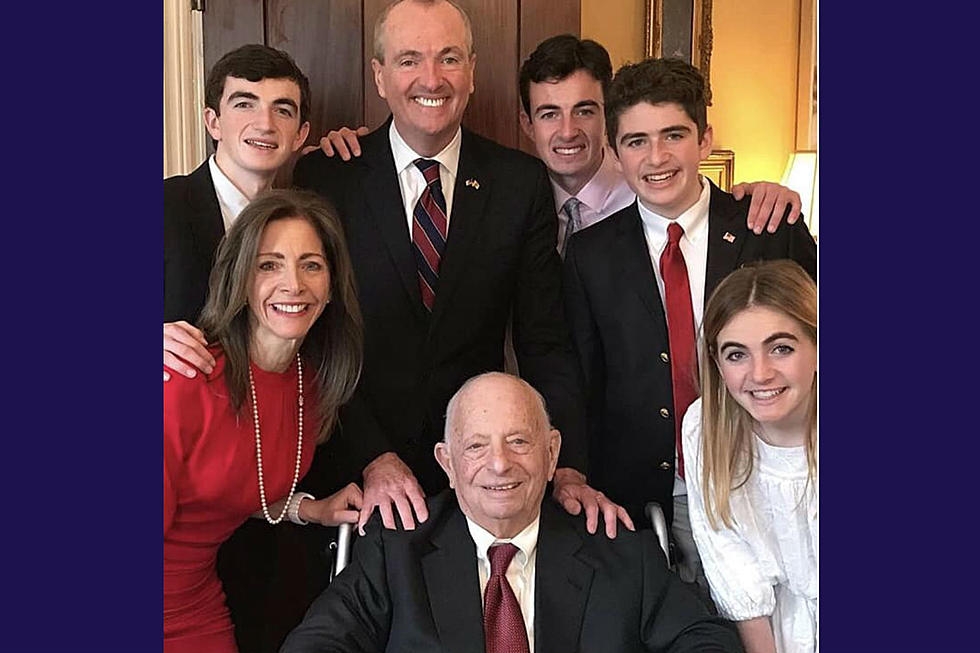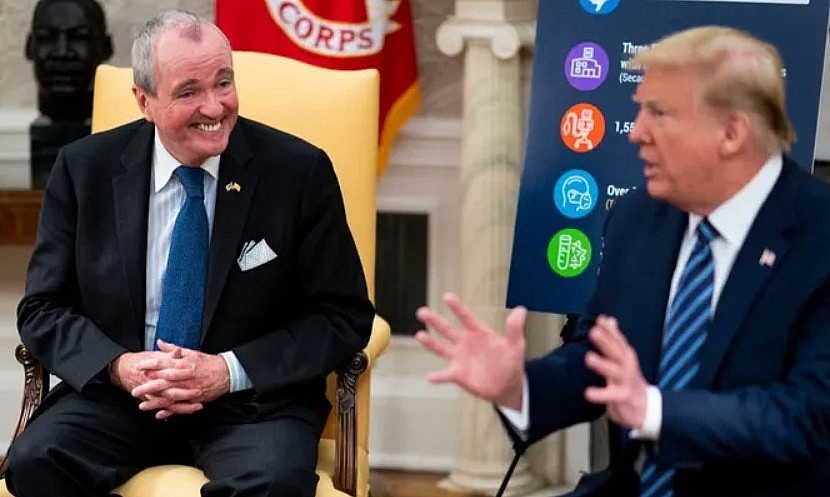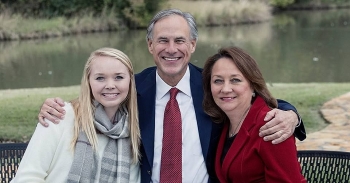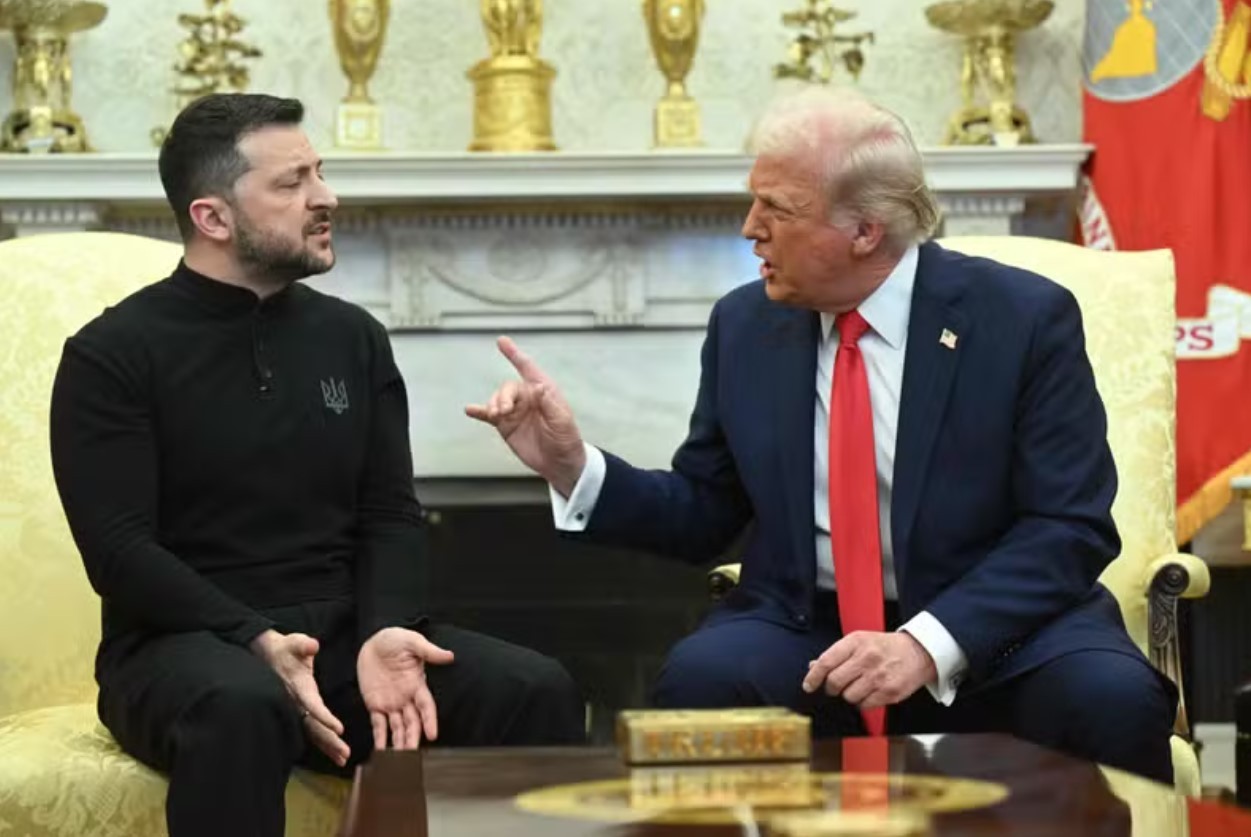Who is Phil Murphy (Gov. of New Jersey): Biography, Family, Career and Net Worth
Phil Murphy, the current Governor of New Jersey, is a Democratic leader known for his progressive policies and dedication to economic reform, social justice, and environmental sustainability. A former financier, diplomat, and progressive advocate, Murphy has reshaped New Jersey’s political landscape since he took office in 2018.
 |
| New Jersey governor says he'll 'fight to the death' against Trump actions 'contrary to values' |
2. Personal Life and Family
Phil Murphy’s personal life reflects his commitment to family values, philanthropy, and public service. He is married to Tammy Snyder Murphy, whom he met while they were both working at Goldman Sachs. Tammy, originally from Virginia, is also from a family that values public service, and her partnership with Murphy has been instrumental in his political journey. The couple married in 1994 and has four children: Josh, Sam, Charlie, and Emma.
Tammy Snyder Murphy: A Dedicated Partner and Advocate
Tammy Snyder Murphy is not only a supportive spouse but an active advocate and leader in her own right. Since becoming New Jersey’s First Lady, she has taken on a significant role in public initiatives, particularly those related to women’s health, child welfare, and education. One of her central focuses has been improving maternal and infant health, a priority that led her to launch the Nurture NJ initiative, aimed at reducing maternal and infant mortality and improving healthcare access for women and children in New Jersey.
Tammy has also co-founded and leads various state programs that promote social and economic reforms, reflecting her shared commitment with Phil to create a more inclusive and supportive state for all residents. Her work has been particularly impactful in underserved communities, where she advocates for better healthcare resources and equal opportunities in education. Tammy’s background in finance and her experience in managing charitable projects have strengthened her role as New Jersey’s First Lady, complementing Phil’s efforts to address social and economic inequalities.
The Murphy Children: A Focus on Education and Community
Phil and Tammy Murphy have four children: Josh, Sam, Charlie, and Emma. The Murphy children have been raised with an emphasis on education, empathy, and community service. While the family has remained relatively private about their children’s personal lives, it’s known that the Murphys prioritize a balanced and grounded upbringing for their kids.
-
Josh Murphy: Josh, the eldest, is known to be athletic and engaged in sports, a quality he shares with his father. His interest in athletics has influenced his education, and he has been active in school sports programs, often representing his school and state in competitive events.
-
Sam Murphy: Sam, the second son, is described as having a strong sense of social justice, something that aligns closely with his father’s values. He is passionate about various causes and has participated in community service activities, especially those focused on youth empowerment and education.
-
Charlie Murphy: Charlie, the third child, has shown an early interest in academics and enjoys participating in school-related activities. His parents have encouraged his curiosity, especially in subjects like history and social studies, which mirror his father’s passion for public service.
-
Emma Murphy: Emma, the youngest, is often seen with her mother Tammy at public events. Known for her compassionate nature, Emma has taken an interest in her mother’s advocacy work, particularly in initiatives related to healthcare and children’s welfare. She has attended events supporting maternal health and education, highlighting her early awareness of her family’s commitment to public service.
The Murphy children are grounded in the values their parents prioritize: hard work, humility, and a sense of responsibility toward others. Phil and Tammy have been careful to provide a stable and nurturing environment, encouraging their children to pursue their interests while instilling a sense of social responsibility.
Residence and Community Engagement
The Murphy family resides in Monmouth County, New Jersey, where they are active participants in local community events and initiatives. Their family home reflects their preference for a grounded and community-focused lifestyle. Monmouth County offers a quieter environment away from the state’s political hub, allowing the Murphys to maintain a sense of normalcy and privacy amid the demands of public office.
Both Phil and Tammy are active in local charitable and community events, often attending or hosting fundraisers for educational programs, healthcare, and social justice causes. Their community involvement underscores their commitment to making a tangible difference in New Jersey beyond their official roles. Tammy’s involvement in local and statewide charitable work complements Phil’s policy-driven efforts, creating a partnership that blends political advocacy with hands-on community support.
Faith and Family Values
While the Murphys keep their religious beliefs private, they have emphasized the importance of faith, integrity, and compassion in raising their family. They believe in teaching their children the value of giving back and staying connected to their community. Phil often credits his family as his moral compass, a grounding influence that guides his decision-making as Governor. Tammy’s philanthropic work, particularly in healthcare and maternal wellness, also reflects her belief in giving back and helping vulnerable populations.
Their values of empathy, service, and resilience are consistently echoed in Phil Murphy’s policy initiatives. His approach to governance reflects the same values he promotes at home, including his dedication to education, economic opportunity, and social equality. The family’s public and private lives intertwine in ways that highlight a commitment to making New Jersey a more inclusive and supportive state for all.
 |
| Photo: NewJersey101.5.com |
3. Career in Business and Banking
After completing his MBA at Wharton, Murphy joined Goldman Sachs in 1983, embarking on a successful 23-year career in finance. At Goldman Sachs, Murphy held various senior positions, including overseeing the firm’s operations in Germany and later leading its business in Asia. His experience at Goldman Sachs not only made him financially successful but also provided him with a global perspective on economic policy, trade, and international relations.
Murphy’s time in the financial industry, however, was not without controversy. Like many high-ranking Wall Street executives, he faced criticism from some who questioned the ethics and impact of large financial institutions on everyday Americans. In response, Murphy has argued that his experience in finance gave him valuable insights into economic policy and that he uses his knowledge to advocate for working families.
Despite the criticism, Murphy credits his experience at Goldman Sachs with preparing him for public service, especially in areas like economic reform and international relations, which would later shape his approach as a public official.
4. Transition to Public Service
Phil Murphy’s transition to public service began after he left Goldman Sachs in 2006. Motivated by a desire to make a difference in government, Murphy shifted his focus from finance to diplomacy and public policy. In 2009, he was appointed by President Barack Obama as the U.S. Ambassador to Germany, a position he held until 2013. As ambassador, Murphy played a key role in strengthening U.S.-German relations during a challenging period marked by the global financial crisis. He worked on issues of economic policy, security cooperation, and diplomatic relations, earning respect for his commitment to multilateralism.
During his time in Germany, Murphy gained significant experience in diplomacy and public administration, which helped him understand the complexity of international relations and the importance of cooperative governance. His diplomatic work prepared him for the political sphere back in the United States, where he became more involved in Democratic politics. Murphy went on to serve as chair of the Democratic National Committee’s finance committee, where he contributed to fundraising efforts and supported progressive candidates nationwide.
5. Gubernatorial Campaign and Election
Phil Murphy launched his gubernatorial campaign in 2016, running as a progressive Democrat focused on economic justice, healthcare access, and social equity. Murphy’s platform resonated with New Jerseyans who were eager for change after years of fiscal challenges under former Governor Chris Christie. Murphy positioned himself as an advocate for working families, promising to reform the economy, expand public education, and promote environmental sustainability.
Despite having no prior experience in elected office, Murphy’s campaign emphasized his commitment to fair governance and a more inclusive economy. His focus on progressive reforms and his personal success in business made him a popular candidate. In November 2017, Murphy won the election against Republican opponent Kim Guadagno and was inaugurated as New Jersey’s 56th Governor in January 2018.
6. Key Achievements and Policies
 |
| New Jersey Gov. Phil Murphy meets with former President Trump. (Getty/File) |
Since taking office, Governor Murphy has worked on a range of progressive policies aimed at economic equality, healthcare access, environmental protection, and criminal justice reform. Here are some of his major achievements and policy initiatives:
A. Economic Reform and Minimum Wage Legislation
Murphy made economic reform a priority, focusing on raising wages and supporting working families. One of his most significant achievements was signing legislation to gradually increase New Jersey’s minimum wage to $15 an hour, which will be fully implemented by 2024. Murphy has consistently advocated for worker rights and fair wages, positioning himself as a champion of economic equality and helping millions of low-income workers improve their standard of living.
B. Public Education and Higher Education Access
Murphy has increased funding for public schools and expanded access to pre-kindergarten programs across New Jersey. His administration launched the Community College Opportunity Grant, which provides tuition-free education for eligible low-income students. Murphy has positioned education as central to New Jersey’s future, advocating for policies that promote equal educational opportunities and preparing students for high-demand careers.
C. Healthcare Access and Reproductive Rights
Governor Murphy has been a vocal advocate for healthcare access, supporting policies that expand Medicaid and protect the Affordable Care Act’s provisions. Under his leadership, New Jersey has codified abortion rights into state law, making it one of the few states with strong legal protections for reproductive rights. Murphy has also prioritized mental health services and addiction treatment, addressing New Jersey’s opioid crisis through comprehensive prevention, treatment, and recovery programs.
D. Environmental Policy and Clean Energy Initiatives
Murphy’s environmental policies have positioned New Jersey as a leader in clean energy and sustainability. He signed an executive order committing New Jersey to 100% clean energy by 2050 and introduced the “Energy Master Plan,” which outlines a roadmap for achieving this goal. His administration has invested in renewable energy projects like wind and solar power, setting ambitious targets to reduce greenhouse gas emissions and promote green jobs. Murphy views environmental sustainability as essential to New Jersey’s future, emphasizing both ethical and economic incentives for a clean energy economy.
E. Criminal Justice Reform and Marijuana Legalization
Murphy’s criminal justice reform agenda includes policies focused on racial equity, reducing incarceration rates, and legalizing marijuana for recreational use. In 2021, New Jersey legalized recreational marijuana, which Murphy framed as both a criminal justice and economic reform. This policy is intended to reduce arrests for minor offenses, address racial disparities in the justice system, and create new economic opportunities through the regulated cannabis market.
7. Political Philosophy and Influence
Governor Phil Murphy’s political philosophy is rooted in progressive values, emphasizing fairness, inclusivity, and opportunity. His background in a working-class family and his experience in finance and diplomacy have informed his commitment to social and economic justice. Murphy’s focus on policies that benefit working-class families, improve education, and protect the environment aligns with his broader vision for a more equitable society.
As a Democrat, Murphy has been a vocal critic of former President Donald Trump, often speaking out against policies he perceives as divisive or harmful to American democracy. Murphy’s progressive stance has earned him a strong base of support among Democrats, and his leadership on issues like healthcare, education, and environmental sustainability has made him a prominent figure in the national Democratic Party. However, his policies have faced opposition from conservatives and some business groups who argue that his reforms place additional financial burdens on businesses.
Conclusion
Phil Murphy’s journey from a working-class upbringing to a prominent political figure in New Jersey reflects his dedication to progressive reform and public service. As Governor, he has championed policies focused on economic fairness, environmental protection, healthcare access, and criminal justice reform, making New Jersey a model of progressive governance. His administration’s efforts to promote equity and sustainability underscore his commitment to building a more inclusive and prosperous state.
Murphy’s leadership and progressive approach continue to shape New Jersey’s future, inspiring both support and debate. As he continues his tenure, Murphy’s policies will likely leave a lasting impact, setting a benchmark for progressive policy and governance in the U.S.
Frequently Asked Questions (FAQs)
1. What are Phil Murphy's main priorities as Governor of New Jersey?
- Governor Phil Murphy focuses on progressive policies that emphasize economic equality, environmental sustainability, healthcare access, and education reform. Key priorities include raising the minimum wage, expanding Medicaid, investing in public schools, and implementing clean energy initiatives to make New Jersey a leader in renewable energy.
2. What is Phil Murphy’s background before he became Governor?
- Before entering politics, Phil Murphy had a long career in finance, working at Goldman Sachs for 23 years, where he held senior roles in Germany and Asia. He later served as the U.S. Ambassador to Germany under President Barack Obama. His experience in finance and diplomacy shaped his approach to public service and gave him insights into both economic policy and international relations.
3. How has Governor Murphy impacted healthcare in New Jersey?
- Governor Murphy has worked to expand healthcare access in New Jersey by increasing Medicaid eligibility and codifying the Affordable Care Act protections at the state level. He also signed legislation protecting reproductive rights and established initiatives for maternal and infant health, including the Nurture NJ program, which aims to improve healthcare access for women and children.
4. Who is Tammy Snyder Murphy, and what role does she play as First Lady of New Jersey?
- Tammy Snyder Murphy, Phil Murphy’s wife, is a dedicated advocate and partner in his public service efforts. As New Jersey's First Lady, she actively supports initiatives related to women’s health, education, and child welfare. One of her significant contributions is the Nurture NJ initiative, which focuses on reducing maternal and infant mortality in New Jersey.
5. What is Phil Murphy's stance on environmental issues and climate change?
- Governor Murphy is a strong advocate for environmental sustainability. He set ambitious goals for New Jersey to achieve 100% clean energy by 2050 and introduced the “Energy Master Plan” to expand renewable energy sources like wind and solar power. His policies aim to reduce greenhouse gas emissions, protect natural resources, and position New Jersey as a leader in clean energy and climate action.
 Who is Gavin Newsom, California's governor: Career and Personal Life Who is Gavin Newsom, California's governor: Career and Personal Life You want to have a deep understanding about Gavin Newsom (Gavin Christopher Newsom in full), the 40th governor of California, serving since January 2019? Knowinsider ... |
 Who is Greg Abbott - Texas's Governor? Who is Greg Abbott - Texas's Governor? Abbott, who has held high-profile roles in the Texas government for more than 20 years, has become one of the most influential politicians – particularly ... |
 Who is Ron DeSantis - Florida's governor? Who is Ron DeSantis - Florida's governor? Ron DeSantis, who was first elected in 2018 is the 46th and current governor of Florida. Let's find out some information about Florida's governor with ... |


























